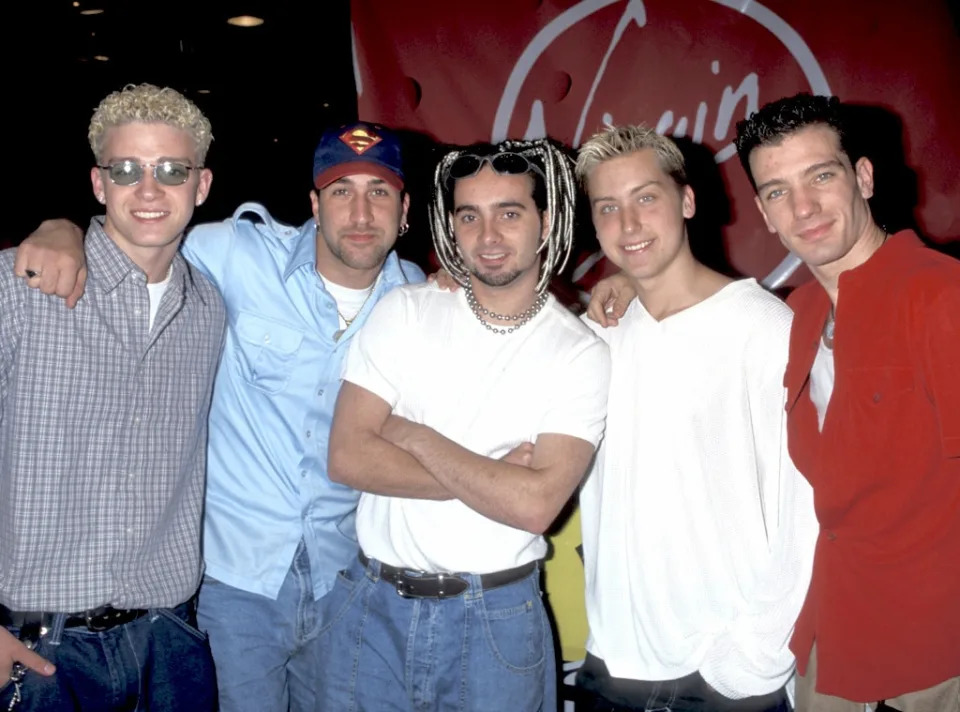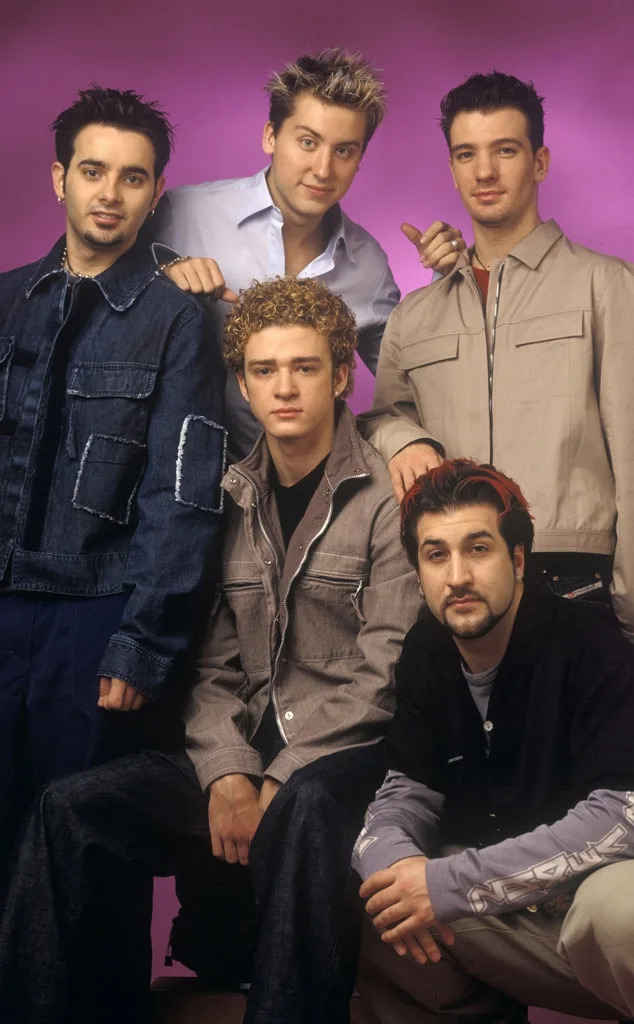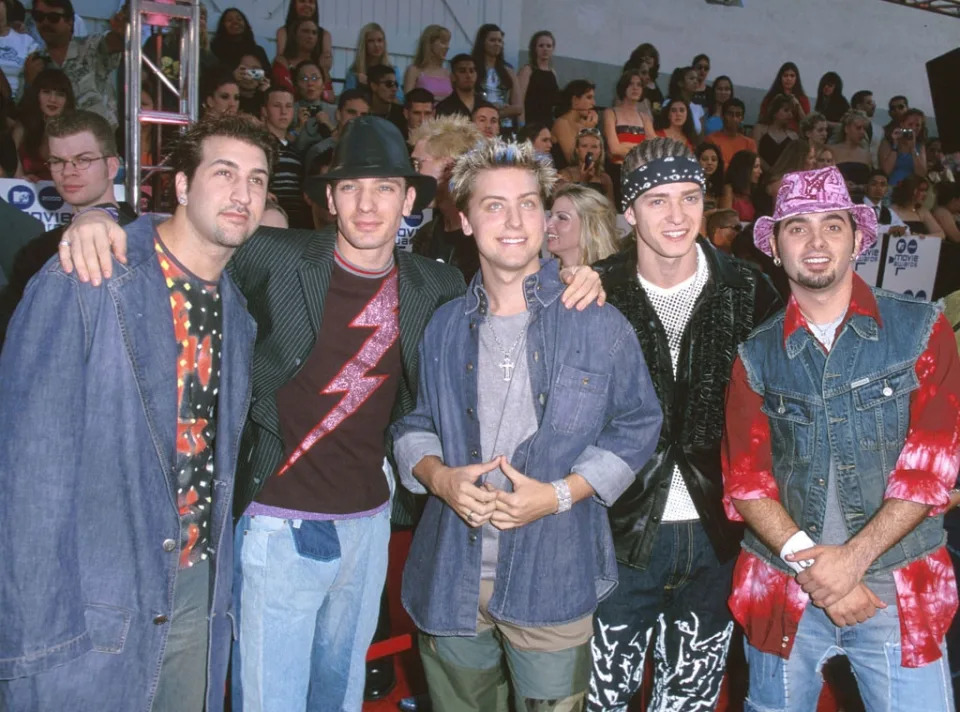There are two types of people in this world: fans of ‘N Sync or Backstreet Boys.
‘N Sync member Lance Bass‘ documentary, The Boy Band Con: The Lou Pearlman Story, was released in 2019, and featured members of multiple boy bands and their families documenting the devastation and deceit they experienced during their time working with former manager Lou Pearlman, their father figure turned enemy.
Pearlman, who died in 2016, was the man credited for kicking off the boy band boom in the ’90s, starting the careers of super-groups like ‘N Sync, Backstreet Boys, LFO and O-Town.
‘N Sync vs. Backstreet Boys: The True Story Behind Their Epic Boy Band Rivalry
But in the ’90s and early aughts, it was all about ‘N Sync and BSB and their battle to top the pop charts, which is exactly how Pearlman wanted it.
And today, with Chris Kirkpatrick admitting he was hardly a fan of BSB’s AJ McLean, we couldn’t help but look back on one of music’s most-hyped—and secretly encouraged—rivalries.
While the BSB vs. ‘N Sync rivalry mostly seemed to be fueled by their warring legions of loyal fans, Bass and other members of the two groups revealed in The Boy Band Con that it was very real for them at the start of their careers, with Pearlman, who was managing both bands, more than happy to have his two prize acts at odds.
So how did Pearlman end up starting, fueling and ultimately ending one of the greatest boy band rivalries?
‘N Sync, Justin Timberlake, JC Chasez, Chris Kirkpatrick, Joey Fatone, Lance Bass
Before becoming the so-called Berry Gordy of the boy band generation, Pearlman was the head of Trans Continental, an Orlando-based umbrella company that included a travel agency, Chippendales dancers and chartering planes. Not exactly a traditional start for a music manager.
But he made the decision to enter the music industry after chartering a private plane for New Kids on the Block, the gold standard of boy bands at the time. “I said to my cousin, ‘How can they afford an airplane, these kids?'” Pearlman remembered asking. That cousin would be Art Garfunkel, of the legendary Simon & Garfunkel, who told him just how much freakin’ money the five guys were making.
“I was on the wrong side of the coin,” Pearlman said. “Artie told me, ‘You’re in business; you like music. You should do something like that.’ So as a weekend goof we decided to do a little audition, and one thing led to another.”
He formed Trans Contintenal Records and launched a $3 million talent contest with his own money in the hopes of finding the next great (money-making) boy band. And that, in a nutshell, is how the Backstreet Boys were formed, with the help of successful music manager Johnny Wright, who worked with NKOTB.
The first member of Backstreet Boys was McLean, who auditioned for Pearlman in his living room after seeing an ad for the contest. After that, Pearlman held an open casting call that took place in a blimp hangar, which later became the heat-filled home of what would be known as “boy band boot camp.” (The process included six to eight hours a day of dance rehearsals, voice lessons and no air conditioning. The ultimate bonding experience.)
Backstreet Boys, 1995
Howie Dorough met Pearlman next in 1992, Nick Carter auditioned soon after and then Kevin Richardson, who was working at Disney World at the time, was somehow recommended by his wannabe music manager’s limo driver. But the necessary fifth slot was proving difficult to fill. That is until Kevin suggested his younger cousin.
“I saw two people, and it was pretty bad,” Richardson recalled to Rolling Stone in 1999. “It just made me sad. And I said, ‘You know what? I have a cousin who can sing his butt off.'”
In fact, Brian Litrell recalled the exact date his life changed in that cover story: April 19, 1993. He was in history class in Kentucky when he was pulled out because he had a phone call with destiny. Richardson told him, “Why don’t you come and, you know, sing with these guys down here? I’m in this group and, you know, we’re going to make records and be famous.'”
So long, college plans. Hello, boy band infamy.
Except it would be three or four years of hard work, traveling all over Europe to make a name for themselves before finally making a splash in the U.S. in 1997. Throughout it all, Pearlman, affectionately called “Big Poppa” by the group, cultivated a family dynamic, hosting big dinners, letting the boys hang out in his mansion—even hosting McLean and Littrell’s joint birthday party.
“Hanging over at Lou’s was like going to Disneyland. He had every freaking toy you could imagine,” McLean said in the band’s 2015 documentary.
What BSB didn’t know, though, was that Pearlman, Wright and co-manager Donna Wright had quietly started working with another boy band.
In 1995, ‘N Sync began with an unlikely first member: Kirkpatrick, who crossed paths with Pearlman when he auditioned to be in BSB. He eventually teamed up with Justin Timberlake and JC Chasez to start forming their own band. After their show The Mickey Mouse Club was canceled, Timberlake and Chasez, who would go on to share lead vocals, had previously recorded demos together in Nashville. The trio eventually ran into Kirkpatricks’ friend Joey Fatone, who was working at one of the theme parks in Orlando, at a club.
NSYNC, 1998
Of course, they needed to find their fifth and final member. While they initially had Jason Galasso as their bass singer, it didn’t work out, though his mark was forever left on the group as their band name came from the last initial of each member’s first name.
Then Timberlake’s vocal coach suggested Bass, a 15-year-old from Mississippi, who flew out to Orlando the day after his Homecoming parade to audition. After agreeing to go by the nickname “Lansten” so they could keep their name, Bass was in and BSB officially had a rival…not that they knew it at the time.
“‘Where there’s Coke, there’s Pepsi, somebody’s going to come along with do the BSB knockoff so why shouldn’t it be us,'” is how author John Seabrook recalled Pearlman explaining the situation to him in The Boy Band Con.
In the beginning, Pearlman definitely had a favorite soft drink.
“With the success of the Backstreet Boys, as ‘N Sync, we always felt like the redheaded stepchild. We couldn’t even go into the record label because the employees there didn’t know we existed,” Bass revealed in The Boy Band Con, adding they were referred to in documents and expense reports as “B5” to keep the secrecy. “And Lou did not want them to know about us just yet because he didn’t want to upset the Backstreet Boys.”
Backstreet Boys, 1997
But they were about to find out in a devastating way.
In their doc, Richardson recalled Pearlman breaking the news of his new band to him in 1995 when he showed him a VHS recording of the rival group performing. “It was almost like a betrayal,” Richardson said. “When we started out, we were like, ‘Yeah, we’re a team. We’re gonna take over the world. There’s nobody like us,'” he continued. “Then you find out, ‘Well, actually there is somebody like you.'”
So why did management stage and encourage this rivalry? They wanted the monopoly on boy bands, of course.
“These guys were talented, meaning ‘N Sync,” Wright said in the Backstreet Boys’ Behind the Music episode, which aired in 2005. “If we didn’t pick them up, somebody else will. For me, it was it’s better that we control the destiny of both groups than someone else who is going to turn the group right against you.”
And besides, it’s not like it hadn’t been done in the music industry before, Wright reasoned in an earlier interview. “[We] used to joke all the time that we were going to turn Orlando into the next Motown, but we were going to call it Snowtown—because we weren’t doing it with R&B acts, we were doing it with pop acts,” he explained to Rolling Stone in 1998. “I guess you could say Backstreet Boys are the Temptations and ‘N Sync are the Four Tops.”
Backstreet Boys, 1995
To help set the two groups apart, their shared management gave them different looks and slightly different sounds.
For Backstreet, their image was “a little bit darker,” so they wore darker clothing. “Harmonies were the thing that they focused on the most,” Johnny explained in The Boy Band Con. ‘N Sync, meanwhile, “were the guys next door. They wore basketball jerseys and shorts and Jordan shoes.” When it came to the music, they “really focused on the performance and the shows.”
(‘N Sync would likely object to that comparison, with Fatone once proudly telling Rolling Stone they had “more intricate harmonies” than their rivals.)
And it was one performance that would prove to be the defining moment for the two bands.
In 1998, BSB was offered the chance to do an hour-long special for the Disney Channel, but after years of nonstop touring and working, they were running on fumes. So they declined. More than happy to dance their way into the slot? ‘N Sync. “Everything we turned down, they got,” is how McLean put it in 2005. “They were right on our coattails.”
The special proved to be the breakout moment that the up-and-coming group had been waiting for. After that, everything changed. “It’s happening now,” Chasez said of the concert special in The Boy Band Con. “That’s when the snowball started rolling.”
And it didn’t stop.
NSYNC, 1998
“The ultimate goal was to do it not once but twice,” Wright said of trying to take ‘N Sync to the next level à la Backstreet, which worked after the Disney Channel special. “I think we’ve done that, and, obviously, it’s caused a problem.”
For ‘N Sync, the underdog band that eventually overtook BSB, they seemed unfazed by the rumors of competition, at least publicly. “People try to make a feud out of everything,” Timberlake told Rolling Stone. “And we didn’t see it like that.”
They may not have seen it like that. But that doesn’t mean their contemporaries felt the same way.
“Backstreet Boys were not happy with ‘N Sync,” Donna Wright said. “They weren’t happy with [Pearlman] because he would put another band together to compete with them.”
McLean put it in much simpler and slightly more graphic terms in The Boy Band Con: “It was the biggest conflict of interest, like it was the biggest… literally don’t s–t where you eat scenario and it really started to bother us.”
The BSB member who felt the most betrayed by Pearlman was Richardson, who especially viewed the producer as a parental figure after losing his father to cancer.
“It’s not ‘N Sync itself but where ‘N Sync comes from that digs me, digs me, digs me—and gets me, still to this day,” he told RS in 2000. “Mr. Pearlman was always speaking loyalty and preaching loyalty, saying, ‘I love you guys; you’re like my sons.’ I’d lost my father to cancer. So I looked at Lou like a father figure. But I was naïve, and he’s a liar. We’ll always remember him for helping us get started. But we’ll also remember him for screwing us blind and building another group behind our backs.”
He continued, “That hurt our feelings. Because for a while it was like, ‘We’re a family.’ Then all of a sudden, ‘It’s business, guys, sorry.’ We have nothing against…that group, personally. It was [Pearlman’s] not being honest.”
NSYNC, 1999
Part of Pearlman’s strategy was taken straight from the hallway of your average middle school: He would complain about BSB to ‘N Sync and vice versa, turning them against each other with lies about diva behavior, with Kirkpatrick saying, “If I were the Backstreet Boys, I would’ve hated us too.”
Bass added, “What Lou told us worked like a charm. He pitted us against each other and we stayed against each other our whole entire careers. If I saw them in a room I would’ve even want to talk to them. I was scared of them. I didn’t know if they were going to yell at me or not.”
They were far from the only super-groups Pearlman attempted to form: C-Note, a Latin boy band; Take 5, a total BSB/’N Sync knockoff that he was hoping would be his third breakthrough group; LFO, a trio that had one major hit in “Summer Girls,” and his first girl group, Innocence.
But at the end of the day, it was all about Backstreet Boys and ‘N Sync, two of the best-selling bands at that time and of all-time.
That rivalry was real—for the guys and for fans. Battle lines were drawn for every teenage girl growing up in that era and you had to choose which band you were going to pledge your undying loyalty to. Except if you were one of their managers, it seemed.
Pearlman wasn’t the only member of their management team that the Backstreet guys felt anger toward over the conflict of interest, as Wright was eventually given an ultimatum by the guys: us or them. “They kind of had it a little easier than we did,” McLean explained in BSB’s Behind the Music special. “So that made us a little bit bitter towards Johnny.”
He chose ‘N Sync.
Justin Timberlake, Lance Bass, Chris Kirkpatrick, JC Chasez, Joey Fatone, NSync, 1998
“Not to say too much…because we are in a legal situation right now—I was made an offer I could refuse,” Wright explained in 1998, as the split was happening. “With all the success and everything that’s going on, we should all be popping champagne and toasting the success that everybody has worked hard for over the last five years, but it’s all mired by other things.”
Of course, he didn’t exactly put out any rivalry fires after his split with BSB was official.
“I don’t want to say anything negative, but Backstreet Boys were put together as five guys who were on roads of their own, five individuals with five individual careers moving forward who are together,” he said in a Rolling Stone cover story about ‘N Sync. “‘N Sync came to me as a group and kind of put themselves together. ‘N Sync, they’re always moving as a group. I have never seen them argue with each other, and that kind of scares me.”
And in the Behind the Music special for BSB, Wright recalled his last encounter with the group before severing ties. “The last thing I said to them was we had a great run together and we were successful together, but now you’re putting me in a position where I have to work against you.’ So I turned my attention to making ‘N Sync the most successful band I possibly could.”
Consider the battle for boy band dominance officially on.
After that, BSB struck first, releasing their smash hit album Millennium. It quickly shattered the record for first-week album sales, selling 1.1 million in its opening week in May 1999.
Backstreet Boys, 1996
Still, success was bittersweet, as the terms of their settlement with Pearlman ended with him still getting 1/6th of their earnings, even though the band, which referred to themselves as “indentured servants” in their suit, collectively had only received $300,000 compared to the $10 million Trans Continental saw from 1993-97. “It’s ridiculous,” Littrell, who was the first to sue Pearlman, told Rolling Stone in 2000. “He’s doing no work.”
At the same time, ‘N Sync was relishing their own freedom following a bitter legal battle with Pearlman. Similar to BSB, Bass memorably recounted Pearlman presenting each member of the band with a check for just $10,000 at a dinner after selling over 10 million records. It was the first time they had been paid aside from receiving a daily $35 stipend.
“Not to sound ungrateful, because it was a lot of money,” Bass said, “but when you compare it to how many hours we had put into this group for years, it didn’t even touch minimum wage at all. It was so insulting. It felt like somebody had punched me in the face.”
Because he didn’t have enough money to hire a lawyer, Chasez asked his uncle, who was an attorney, to look over their contract. “This is one of the worst contracts I’ve ever seen in music industry,” was the assessment, with the family member realizing Pearlman has basically made himself the sixth member of the band.
Lou Pearlman
“He wanted to be the sixth member of the group…and I think he wanted those boys to see him that way too,” Timberlake’s mom Lynn said in The Boy Band Con, “and if he hadn’t taken advantage of them, they would have.”
Thanks to a small technicality they found in their contract—if they weren’t signed to a label in the U.S.in a certain amount of time their contract was void, and they had been signed to a label in Germany—’N Sync was able to get away from Trans Continental and RCA…but Pearlman wasn’t about to go down without a fight, suing the band for the name ‘N Sync in a $150 million lawsuit in October 1999. The band countersued for $25 million.
They ultimately got to keep their name, with the suit being settled out of court. They left RCA and joined Jive Records, BSB’s label.
And their 1999 emancipation from Pearlman proved to be the ultimate inspiration for the group’s next album, No Strings Attached, a direct reference to their puppet strings being cut. Their first single? “Bye Bye Bye.”
Subtle? No. Successful? Insanely so.
Just how much a monster success was No Strings Attached? It sold 2.4 million copies in its first-week in 2000, basically doubling the previous record, which was set only months before by their archrival. (Their record wouldn’t be broken until Adele‘s 25 in 2015.)
‘N Sync, Ellen DeGeneres
Ahead of Celebrity‘s release in 2001, ‘N Sync wanted to make it clear they were different than—ahem—some other groups in their genre.
“It’s really almost like a bad slang to us,” Kirkpatrick told Rolling Stone of the “boy band” label. “When you say ‘boy band,’ you’re grouping us into a bunch of groups that everybody thinks are very similar, and they’re nothing like us. They may be five guys or four guys or other similarities here and there, but it’s just one of those things. We’ve spent six years trying to get out of the shadow of being this boy-band thing.”
One year after Celebrity‘s release, ‘N Sync announced they were going on a temporary hiatus. But it ended up becoming a permanent end to the group as they never recorded or toured together again.
Over the years, ‘N Sync has occasionally reunited to perform together, including the 2013 MTV Music Video Awards to perform a medley of their hits as part of a tribute to Timberlake, who was receiving the Vanguard Award. In 2018, they reunited once again to receive their star on the Hollywood Walk of Fame, making a joint appearance on The Ellen Degeneres Show.
One person not ready to get out of the boy band shadow was Pearlman.
NSYNC, Justin Timberlake, JC Chasez, Chris Kirkpatrick, Joey Fatone, Lance Bass, 2000
Even though his lawsuits with Backstreet and ‘N Sync were well-documented, Pearlman continued to try and find the next big thing in music, even launching ABC and later MTV’s hit series, Making the Band, which formed O-Town.
“When I saw that,” Richardson said of the show, “I about puked. I mean, the average person sitting there watching that show is probably like, ‘So this is how the Backstreet Boys came to be.’ No, it’s not. All he did was give us money to go into the studio and work on our craft, which we are thankful for. But he’s making himself to be the guy twisting the knobs, and it’s just not so.”
Like ‘N Sync, BSB used their experience with Pearlman and the indelible marks it left on them as fuel for their third album, 2000’s Black and Blue, a reference to the way their former mentor had bruised them.
“We’re on to bigger and better things,” Littrell said of the experience. “And we’re better men for it.”
Ultimately, their respective betrayals brought them together, something “Big Poppa” never would’ve expected and absolutely dreaded, with Wright recalling a big moment just before the bands made their big moves against Pearlman. Both bands were competing in a charity basketball game, with Timberlake, Chasez, Littrell and Carter heading to McDonald’s afterwards. Wright could hear them whispering about Pearlman in the back of the car, both reps from each band airing their grievances.
“That was why he kept the two bands apart from each other,” The Boy Band Con‘s director Aaron Kunkel told People, “because he knew that if they started talking to each other, they could start comparing notes.”
Soon after, a “livid” Littrell went to the other members and said, ‘I want to file a lawsuit.'”
The rest of the band eventually filed suits as well, as they were the first of Pearlman’s acts to take legal action against him.
Backstreet Boys, 1998
“He ended up bringing us all together more,” Bass told People. “Look at the Backstreet Boys, right? We never spoke to them. We were always afraid of them. Now after the fact, we’re all really good friends because they went through something that we can only relate to—it really bonded all of us.”
But that didn’t mean the Backstreet Boys’ members were jumping at the chance to take part in The Boy Band Con, hesitant to open up about their experience with Pearlman again.
“Backstreet Boys were basically like, ‘No, we won’t even touch this!'” Bass revealed during a live taping of the Homophilia podcast at SXSW, where The Boy Band Con held its world premiere. But one member was willing to speak.
“A.J. wanted to do it, like, ‘Look, I’ll talk for the boys, they trust me to tell our story,'” Bass said.
For McLean, it’s still “complicated,” as he explained to The Irish Times. “Some of us will never come to terms with it. He gave us the opportunities that led us to getting signed to Jive Records. It’s sad. Had he not gone that route he’d still probably be a huge part of our lives,” he said. “But business and greed got in the way. I don’t think any of us hates him truly. It’s bittersweet. It’s hard to hate someone that brought you into your own. But it’s also really hard to respect someone who lied to your face for who knows how long.”
Backstreet Boys, 2019 iHeartRadio Music Awards, Arrivals
Aside from ending any feud or rivalry with ‘N Sync that was contrived by Pearlman, BSB later reconciled with Wright. The band teamed up with their former manager again in 2003, with McLean saying in the Behind the Music episode, “Why not put the A team back together that was together a decade ago?”
After a lengthy hiatus, BSB released its comeback album, Never Gone, in 2005, but just one year later, Richardson announced he was leaving the group. “He gave his blessing to continue the music without him,” the remaining four members said in a statement. “We have no intention of replacing Kevin, and the door will always be open for him to return to the Backstreet Boys. We wish him the all the best in his future endeavors.”
Two albums and six years later, Richardson rejoined the group permanently. They’ve since released more albums, started a Las Vegas residency and have sold over 100 million records worldwide, becoming one of the best-selling boy band of all-time.
As for Pearlman, he was sentenced to 25 years in prison in 2008 after being accused of running one of the largest and longest-running Ponzi schemes in history, bilking investors out of more than $300 million.
BSB took him back to court in 2014, claiming they were still owed almost $3.5 million. Eventually, the band received a settlement of $99,000 cash, 34 audio tape reels, 26 CDs, seven studio mastering audio tapes, six sealed posters, three audio cassettes and one VHS tape. The recordings included some unreleased mixes, demos and original materials.
In 2010, Pearlman suffered a stroke while incarcerated, and in 2016, he died after going into cardiac arrest.
“It was the most mixed emotions ever,” Kirkpatrick said in The Boy Band Con of Pearlman’s passing. “You don’t know whether to cry. You don’t know whether to laugh. You don’t know whether to be relieved. You don’t know whether to feel bad for him, happy for everyone else. There is so much wrong with everything about him and what happened that you don’t even know how to take death.”
(Originally published on Wed. Apr 3, 2019, 3:00 a.m. PST)



















